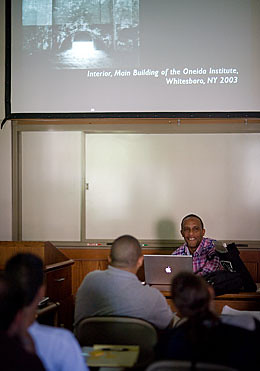While his students are on summer vacation, Patrick O’Neil, a social studies teacher from Charlotte, N.C., is spending time in a “summer school” at ¸Ô±ľĘÓƵ.
 |
| Graham Hodges has written numerous books and articles about slavery. |
O’Neil and two dozen other K-12 teachers from as far away as California are taking on the role of students, receiving a history lesson of their own as they attend the Institute on Abolitionism and the Underground Railroad in upstate New York.
The three-week seminar at ¸Ô±ľĘÓƵ is funded by the National Endowment for the Humanities and supported by the university’s Upstate Institute.
“Our goal is for teachers to bring back what they learn here to help jump-start their students’ knowledge,” said ¸Ô±ľĘÓƵ professor Graham Hodges, director of the teachers’ institute.
For O’Neil, the experience is giving him new ideas, which will help enhance his lesson plans.
“If I can develop new ways to get my students talking and revved up about this important part of American history, it makes a difference,” said O’Neil.
During seminars held in Alumni Hall, the teachers are learning from 16 leading scholars, writers, photographers, and singers from across the country.
 |
| Professor William Williams, of Haverford College, teaches a class during the Institute on Abolitionism and the Underground Railroad in upstate New York. (Photo by Andy Daddio) |
Jessica Clarke, a history teacher at Camden (N.Y.) High School, said “the small group, varied experiences, and ample opportunities for collaboration and reflection are unique aspects of the program.”
¸Ô±ľĘÓƵ is a perfect setting for this institute, added Hodges, who is leading several of the lectures about the history of slavery.
Upstate New York was one of the most important centers of abolitionist activity and home to key figures including Frederick Douglass, John Brown, and Harriet Tubman.
In the coming weeks, the group will explore the rich heritage of the area with “field trips” to sites of interest such as the Harriet Tubman House in Auburn and the National Abolitionist Hall of Fame in nearby Peterboro.
“Our outings to local landmarks will help me determine what would make the best day trips for my own students, allowing them to become more aware of the history in our backyard,” said Clarke.